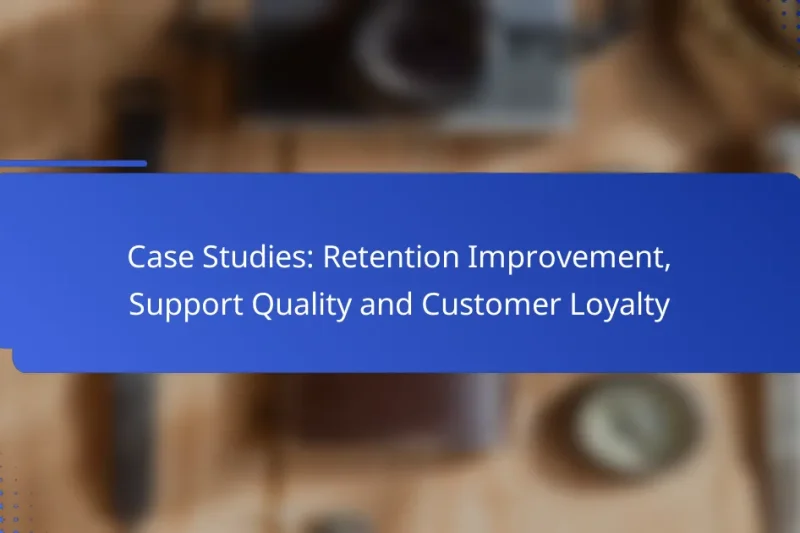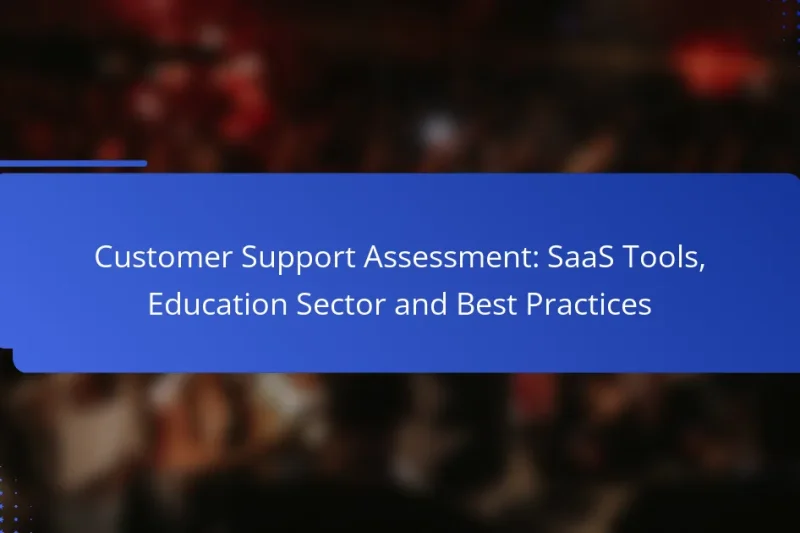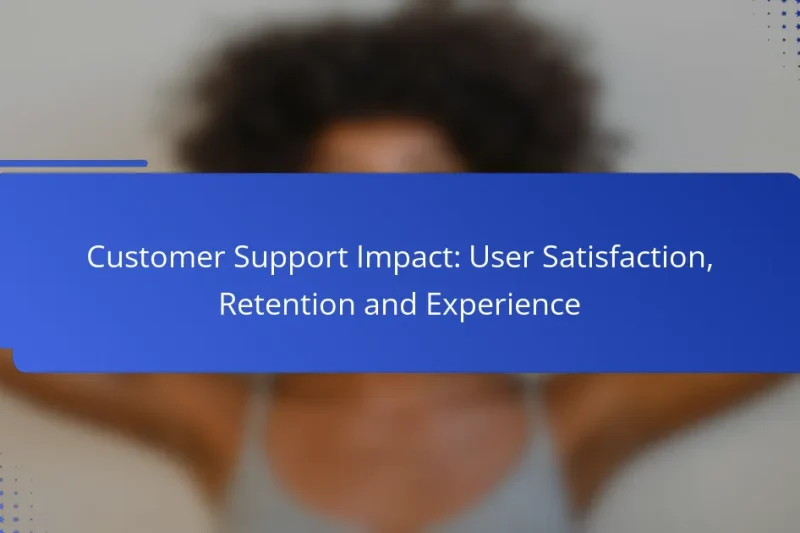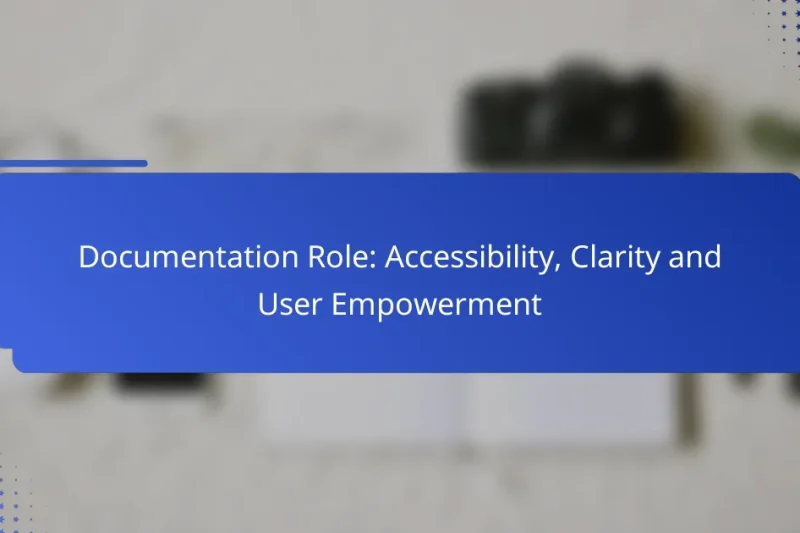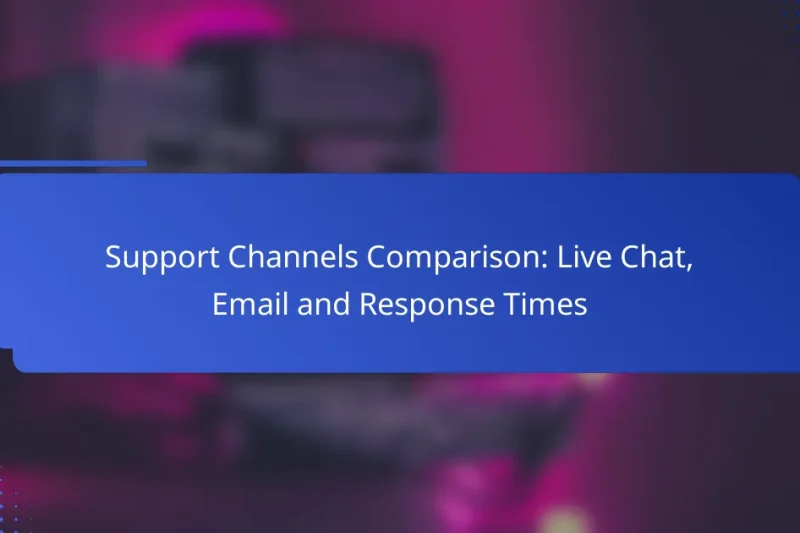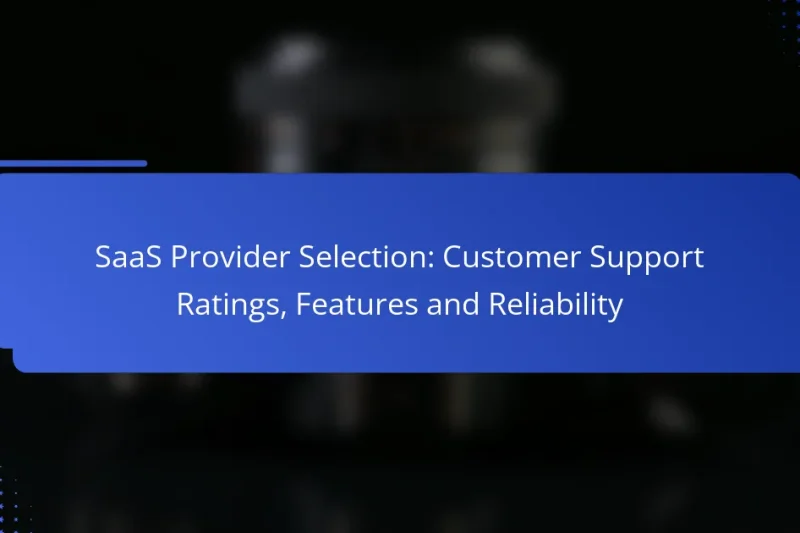In the competitive landscape of SaaS companies in Canada, improving customer retention, support quality, and loyalty … Case Studies: Retention Improvement, Support Quality and Customer LoyaltyRead more
SaaS Productivity Software: Customer Support Services
SaaS productivity software for customer support in Canada offers essential tools that enhance communication, ticket management, and customer engagement. Solutions like Zendesk and Freshdesk streamline processes and automate tasks, enabling support teams to respond more efficiently and improve customer satisfaction. When choosing a customer support SaaS, it’s crucial to focus on features that enhance communication and user experience to meet your business needs effectively.
Customer Support Assessment: SaaS Tools, Education Sector and Best Practices
In the education sector, effective customer support is essential for fostering communication between institutions and students. … Customer Support Assessment: SaaS Tools, Education Sector and Best PracticesRead more
Customer Support Impact: User Satisfaction, Retention and Experience
Customer support plays a crucial role in shaping user satisfaction and retention by promptly addressing concerns … Customer Support Impact: User Satisfaction, Retention and ExperienceRead more
Documentation Role: Accessibility, Clarity and User Empowerment
Effective documentation plays a crucial role in enhancing accessibility and clarity for users of SaaS tools. … Documentation Role: Accessibility, Clarity and User EmpowermentRead more
Support Channels Comparison: Live Chat, Email and Response Times
In the realm of customer support, the choice of channel—live chat or email—can greatly influence response … Support Channels Comparison: Live Chat, Email and Response TimesRead more
SaaS Provider Selection: Customer Support Ratings, Features and Reliability
Selecting the right SaaS provider involves a careful evaluation of customer support ratings, essential features, and … SaaS Provider Selection: Customer Support Ratings, Features and ReliabilityRead more
Customer Support Options: Evaluation Criteria, Benefits and Trends
In today’s competitive landscape, selecting the right customer support options is crucial for SaaS companies in … Customer Support Options: Evaluation Criteria, Benefits and TrendsRead more
What are the best SaaS productivity software for customer support in Canada?
The best SaaS productivity software for customer support in Canada includes solutions that streamline communication, ticket management, and customer engagement. Popular options like Zendesk, Freshdesk, Intercom, Help Scout, and Zoho Desk offer various features tailored to enhance customer service efficiency and satisfaction.
Zendesk
Zendesk is a leading customer support platform known for its robust ticketing system and user-friendly interface. It allows businesses to manage customer inquiries across multiple channels, including email, chat, and social media.
With features like automation, reporting, and a customizable help center, Zendesk is suitable for companies of all sizes. Pricing typically ranges from CAD 5 to CAD 200 per agent per month, depending on the plan selected.
Freshdesk
Freshdesk offers a comprehensive suite for customer support, featuring ticket management, a knowledge base, and collaboration tools. Its intuitive design makes it easy for teams to track and resolve customer issues efficiently.
Freshdesk provides a free tier for small teams, while paid plans start at around CAD 19 per agent per month. This flexibility makes it an attractive option for startups and growing businesses.
Intercom
Intercom focuses on customer engagement through live chat and messaging features, allowing businesses to interact with customers in real-time. Its automation tools help streamline responses and improve response times.
Intercom’s pricing is based on the number of users and features selected, typically starting at CAD 87 per month. This platform is ideal for companies looking to enhance their customer communication strategy.
Help Scout
Help Scout provides a simple and effective way to manage customer support through shared inboxes and collaboration tools. It emphasizes a personal touch, allowing teams to respond to customers as if they were using a regular email client.
With pricing starting at approximately CAD 20 per user per month, Help Scout is suitable for small to medium-sized businesses that prioritize customer relationships and straightforward support processes.
Zoho Desk
Zoho Desk is part of the Zoho suite and offers a range of features for managing customer support, including ticketing, automation, and reporting. It integrates well with other Zoho applications, making it a good choice for businesses already using Zoho products.
Pricing for Zoho Desk starts at around CAD 14 per agent per month, making it an affordable option for businesses looking to enhance their customer support capabilities without significant investment.
How do SaaS customer support tools improve productivity?
SaaS customer support tools enhance productivity by streamlining processes, automating repetitive tasks, and providing valuable insights. These tools enable support teams to respond faster and more effectively, ultimately leading to improved customer satisfaction and retention.
Streamlined communication
Streamlined communication is essential for efficient customer support. SaaS tools centralize interactions across various channels, such as email, chat, and social media, allowing support teams to manage inquiries from a single platform. This reduces response times and ensures that customer issues are addressed promptly.
To maximize the benefits of streamlined communication, consider implementing a unified messaging system. This can help eliminate confusion and ensure that all team members have access to the same information, leading to more consistent and informed responses.
Automated ticketing systems
Automated ticketing systems simplify the process of tracking and managing customer inquiries. These systems automatically categorize and prioritize tickets based on predefined criteria, allowing support agents to focus on high-priority issues first. This can significantly reduce the time spent on manual ticket management.
When choosing an automated ticketing system, look for features such as customizable workflows and integration with other tools. This ensures that the system aligns with your team’s specific needs and can adapt as those needs evolve.
Performance analytics
Performance analytics provide insights into customer support operations, helping teams identify areas for improvement. By analyzing metrics such as response times, ticket resolution rates, and customer satisfaction scores, organizations can make data-driven decisions to enhance their support processes.
To effectively leverage performance analytics, regularly review key performance indicators (KPIs) and set achievable goals. This practice not only helps in tracking progress but also fosters a culture of continuous improvement within the support team.
What features should I look for in customer support SaaS?
When selecting customer support SaaS, prioritize features that enhance communication, streamline processes, and improve user experience. Key aspects include multi-channel support, integration capabilities, and customizable workflows to meet specific business needs.
Multi-channel support
Multi-channel support allows customers to reach your service team through various platforms such as email, chat, phone, and social media. This flexibility enhances customer satisfaction by providing options that suit their preferences. Look for solutions that unify these channels into a single interface for easier management.
Consider the volume of inquiries across different channels to ensure the software can handle peak times without delays. A good practice is to monitor response times and customer feedback to adjust your support strategy accordingly.
Integration capabilities
Integration capabilities enable your customer support software to connect with other tools like CRM systems, ticketing platforms, and analytics services. This connectivity streamlines workflows and ensures that customer data is accessible across departments. Evaluate the ease of integration with your existing systems to avoid disruptions.
Check for pre-built integrations or APIs that allow for custom connections. A well-integrated system can reduce manual data entry and improve overall efficiency, leading to faster response times and better service quality.
Customizable workflows
Customizable workflows allow businesses to tailor their support processes to match specific operational needs. This feature can include setting up automated responses, routing tickets based on priority, or creating unique escalation paths for different issues. Customization helps ensure that support teams can respond effectively to various customer scenarios.
When assessing this feature, consider how easily workflows can be modified as your business evolves. Look for platforms that offer visual workflow builders or templates to simplify the setup process, enabling quick adjustments without extensive technical knowledge.
What are the pricing models for SaaS customer support software?
SaaS customer support software typically employs various pricing models to accommodate different business needs. The most common models include subscription-based pricing, tiered pricing plans, and pay-per-use models, each with unique advantages and considerations.
Subscription-based pricing
Subscription-based pricing is a straightforward model where customers pay a recurring fee, usually monthly or annually, for access to the software. This model often includes different levels of service, allowing businesses to choose a plan that fits their size and support needs.
For example, a small business might opt for a basic plan at around $50 per month, while larger enterprises may choose premium plans that can exceed $500 monthly. This model provides predictable costs and often includes regular updates and support.
Tiered pricing plans
Tiered pricing plans offer multiple service levels, each with varying features and support options. This allows businesses to select a plan that aligns with their specific requirements and budget.
For instance, a tiered structure might include a basic plan for $30 per month, a standard plan for $100, and a premium plan for $300, with each tier providing additional features such as advanced analytics or dedicated support. This model is beneficial for scaling businesses as they can upgrade as their needs grow.
Pay-per-use models
Pay-per-use models charge customers based on their actual usage of the software, making it a flexible option for businesses with fluctuating support needs. This model can be particularly appealing for companies that experience seasonal spikes in customer inquiries.
For example, a business might pay $1 per support ticket or $0.10 per minute of live chat support. While this model can lead to lower costs during quieter periods, businesses should monitor usage closely to avoid unexpected expenses during peak times.
How to choose the right customer support SaaS for my business?
Choosing the right customer support SaaS involves understanding your business needs, evaluating user feedback, and comparing trial options. A well-suited solution can enhance customer satisfaction and streamline support processes.
Assess business needs
Start by identifying the specific requirements of your business. Consider factors such as the size of your team, the volume of customer inquiries, and the channels you wish to support, like email, chat, or social media.
For example, a small business may prioritize a user-friendly interface and basic ticketing features, while a larger enterprise might need advanced analytics and multi-channel support. Make a list of must-have features to guide your selection.
Evaluate user reviews
User reviews provide valuable insights into the performance and reliability of customer support SaaS options. Look for feedback on ease of use, customer service quality, and integration capabilities with existing tools.
Websites like G2 and Capterra can help you compare ratings and read detailed experiences from other businesses. Pay attention to common praises and complaints to gauge whether a solution aligns with your expectations.
Compare trial options
Most customer support SaaS providers offer free trials or demo versions. Take advantage of these to test the software in real-world scenarios relevant to your business.
During the trial, evaluate the user interface, responsiveness, and any unique features that stand out. Make sure to involve your support team in the testing process to gather their feedback on usability and functionality.
What are the integration options for SaaS customer support tools?
SaaS customer support tools offer various integration options that enhance functionality and streamline operations. These integrations can connect with other software systems, such as CRM platforms, to improve data flow and customer interactions.
CRM integrations
CRM integrations are essential for SaaS customer support tools as they allow seamless data exchange between customer support and sales teams. This connection helps in tracking customer interactions, managing leads, and providing personalized support based on customer history.
When considering CRM integrations, look for compatibility with popular platforms like Salesforce, HubSpot, or Zoho. Ensure that the integration supports real-time data updates to maintain accurate records and enhance customer service efficiency.
Common pitfalls include selecting a CRM that lacks robust API support or underestimating the complexity of integration. To avoid issues, verify that your chosen customer support tool offers clear documentation and customer support for the integration process.
